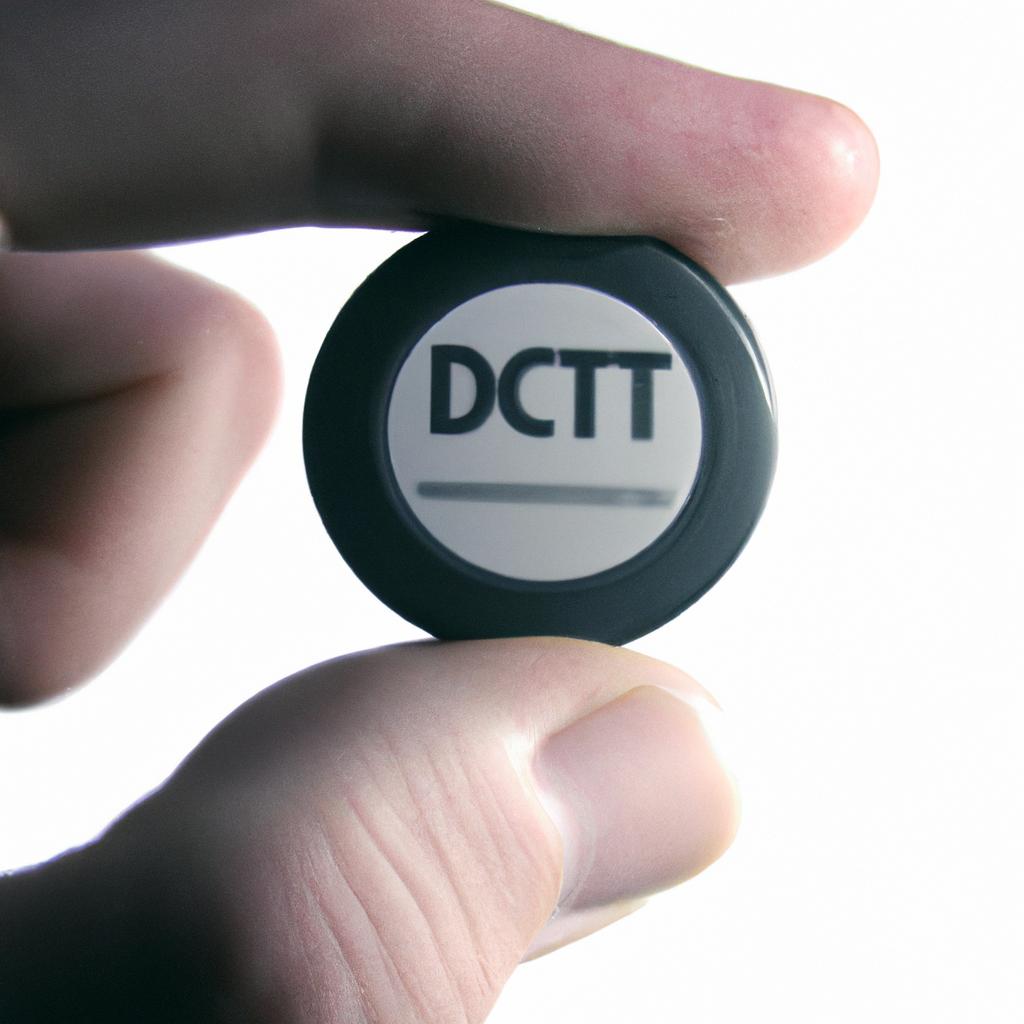Tokenization: The Role of Tokens in Computer and Software: The Blockchain Context

The advent of blockchain technology has revolutionized the way we perceive and interact with computer systems and software. One vital concept that has emerged in this context is tokenization, whereby digital tokens are used to represent various assets or rights on a decentralized network. For instance, imagine a hypothetical scenario where a company wants to raise funds for a new project. Instead of going through traditional funding channels like banks or venture capitalists, they decide to tokenize their assets by issuing digital tokens that can be purchased by interested investors. These tokens not only serve as proof of ownership but also provide access to certain functionalities within the company’s ecosystem.
In the realm of computer and software systems, the role of tokens cannot be underestimated. Tokens play a crucial part in facilitating secure transactions, ensuring data integrity, and governing access control mechanisms. By leveraging blockchain technology, tokens enable peer-to-peer interactions without requiring intermediaries, thereby eliminating the need for trust in centralized authorities. Furthermore, tokens can hold intrinsic value themselves or act as representations of external assets such as currencies, real estate properties, or intellectual property rights.
With an increasing number of industries exploring the potential applications of tokenization in computer and software systems, it becomes imperative to delve deeper into understanding its mechanics and implications. This article aims to shed light on the various aspects of tokenization in computer and software systems, including its benefits, challenges, and potential use cases.
One of the key advantages of tokenization is its ability to enhance security and privacy in transactions. Tokens can be designed with built-in cryptographic protocols that ensure the confidentiality and integrity of data being exchanged. By utilizing public-key cryptography, tokens can provide secure authentication and verification mechanisms, thereby reducing the risk of fraud or unauthorized access.
Another benefit of tokenization is its potential for creating interoperable ecosystems. With tokens serving as a common medium of exchange within a network, different entities can seamlessly interact and transact with each other. This opens up new possibilities for collaboration, value creation, and innovation across various industries.
However, tokenization also brings forth certain challenges that need to be addressed. One such challenge is regulatory compliance. As tokens represent ownership or rights to assets, they may fall under existing regulations governing securities or financial instruments. Companies issuing tokens must navigate through these regulatory frameworks to ensure legal compliance.
Moreover, scalability and performance are important considerations when implementing tokenized systems. Blockchain networks have inherent limitations in terms of transaction throughput and latency. Designing efficient consensus mechanisms and optimizing network infrastructure becomes crucial to support large-scale tokenized applications.
Despite these challenges, there are numerous use cases where tokenization can revolutionize computer and software systems. For example, in supply chain management, tokens can track the movement of goods from the source to the end consumer, ensuring transparency and authenticity along the way. In digital identity management, tokens can provide a decentralized approach to authenticating users without relying on centralized authorities.
In conclusion, tokenization has emerged as a powerful concept in computer and software systems with far-reaching implications. Its ability to enable secure transactions, create interoperable ecosystems, and transform various industries makes it an exciting area of exploration for businesses and developers alike. As more organizations embrace blockchain technology and understand the potential of tokenization, we can expect to see innovative solutions and advancements in the digital landscape.
What are tokens and their role in computer and software systems?
Tokenization is a concept that has gained significant attention in the field of computer and software systems, particularly within the context of blockchain technology. In simple terms, tokens are digital representations or assets that can be used to represent real-world objects, rights, or privileges. They play a crucial role in facilitating various functionalities and interactions within computer and software systems.
To illustrate this further, let’s consider an example where tokenization is applied in the realm of online gaming platforms. Imagine a virtual world where players can buy and sell unique items such as weapons, armor, or even rare collectibles. Instead of using traditional currencies like dollars or euros for these transactions, the platform utilizes tokens specific to their ecosystem. These tokens act as a medium of exchange between users within the game environment.
The use of tokens brings several advantages to computer and software systems:
-
Enhanced security: Tokens provide an additional layer of security by utilizing cryptographic techniques. Each token is uniquely identified through its digital signature, making it tamper-proof and resistant to fraud.
-
Increased transparency: Tokenized systems often leverage blockchain technology, which ensures transparent recording and tracking of all token transactions. This transparency helps establish trust among participants by providing them with immutable records that cannot be altered without consensus from multiple parties.
-
Improved efficiency: By eliminating intermediaries typically involved in traditional transactions (such as banks or payment processors), tokenization streamlines processes and reduces costs associated with third-party fees.
-
Greater accessibility: The fractional nature of tokens allows for microtransactions, enabling individuals who may not have access to conventional banking services to participate in various activities within computer and software systems.
| Advantages of Tokenization |
|---|
| Enhanced Security |
| Increased Transparency |
| Improved Efficiency |
| Greater Accessibility |
In summary, tokens serve as vital components within computer and software systems by representing digital assets, rights, or privileges. Their utilization brings several advantages, including enhanced security, increased transparency, improved efficiency, and greater accessibility. Understanding the role of tokens in these systems sets the stage for exploring their benefits within the context of blockchain technology.
Transitioning into the subsequent section on “The benefits of tokenization in the context of blockchain,” it becomes evident that tokenization plays a fundamental role in unlocking new possibilities and revolutionizing various industries.
The benefits of tokenization in the context of blockchain
Section H2: The benefits of tokenization in the context of blockchain
Tokenization, as a process of converting sensitive data into unique tokens, plays a crucial role in computer and software systems, particularly within the context of blockchain technology. By replacing sensitive information with these tokens, businesses can enhance security and privacy while maintaining functionality. One notable example that highlights the benefits of tokenization is its application in mobile payment platforms.
Consider a hypothetical scenario where a user wants to make a purchase using their mobile phone at a retail store. Instead of transmitting their credit card details directly to the merchant’s system, which could potentially be intercepted by hackers or compromised through other means, tokenization provides an added layer of protection. In this case, the user’s credit card information is replaced with a unique token generated by their mobile wallet app. This transaction-specific token is then securely transmitted to the merchant’s system for processing.
The advantages of implementing tokenization within computer and software systems extend beyond enhanced security alone. Let us explore some key benefits:
- Simplified compliance: Tokenizing sensitive data helps organizations meet regulatory requirements such as Payment Card Industry Data Security Standard (PCI DSS). Compliance becomes more manageable since only non-sensitive tokens are stored or transmitted.
- Minimized data breach impact: In the event of a data breach, stolen tokens hold little value to attackers without access to additional encryption keys required to decrypt them. This reduces potential harm caused by unauthorized access.
- Streamlined operations: By removing sensitive data from regular business processes and storing it separately in secure environments, companies can streamline operations and minimize risk associated with handling confidential customer information.
- Enhanced customer trust: Tokenization demonstrates commitment towards protecting customers’ personal and financial information. Such proactive measures foster trust among users and can lead to increased customer loyalty.
To further illustrate the significance of tokenization, consider Table 1 below:
Table 1: Comparison between Traditional Data Storage vs Tokenized Data Storage
| Traditional Data Storage | Tokenized Data Storage |
|---|---|
| Direct storage of sensitive data | Replacement of sensitive data with unique tokens |
| Higher risk of unauthorized access and misuse | Enhanced security due to tokenization |
| Potential compliance challenges | Simplified regulatory compliance |
| Increased vulnerability to cyberattacks | Reduced impact in case of a data breach |
As seen from the table, tokenization offers multiple advantages over traditional methods of storing sensitive information. It not only addresses security concerns but also facilitates compliance efforts while improving operational efficiency.
In the subsequent section about “How tokenization improves security and privacy,” we will delve deeper into the specific ways in which tokenization enhances these aspects within computer and software systems.
How tokenization improves security and privacy
Building upon the benefits discussed earlier, tokenization in the context of blockchain technology also plays a crucial role in enhancing security and privacy. By converting sensitive data into unique tokens, individuals can enjoy increased protection against unauthorized access while maintaining their privacy.
Tokenization not only provides an additional layer of security but also minimizes the risk of data breaches. For instance, consider a hypothetical scenario where a healthcare organization adopts tokenization to secure patient records. Instead of storing personal information like names, addresses, and social security numbers directly in their database, they tokenize this data by assigning each patient a unique identifier. In case of a cyberattack or breach, the stolen information would be rendered useless without the corresponding tokens necessary for decryption.
To further illustrate the impact of tokenization on security and privacy, let’s explore some key advantages:
- Reduces identity theft: With tokenization, valuable personally identifiable information (PII) is replaced with non-sensitive tokens that are meaningless to potential attackers.
- Enhances compliance: Tokenizing sensitive data helps organizations comply with privacy regulations such as GDPR (General Data Protection Regulation) by reducing the amount of personal data stored within systems.
- Safeguards financial transactions: Tokens enable secure payment processes by replacing credit card details with randomized alphanumeric strings, protecting customers’ financial information from being compromised during online transactions.
- Preserves anonymity: Through tokenization, users can engage in activities while preserving their anonymity since their real identities are concealed behind unique identifiers.
This table summarizes how tokenization enhances security and privacy:
| Advantages | Description |
|---|---|
| Reduces identity theft | Replaces sensitive PII with non-sensitive tokens |
| Enhances compliance | Helps organizations meet privacy regulations |
| Safeguards financial transactions | Protects customer financial information during online payments |
| Preserves anonymity | Allows users to maintain privacy and engage in activities without exposure |
In summary, tokenization within the blockchain context provides significant improvements in security and privacy. By replacing sensitive data with tokens, organizations can mitigate risks associated with unauthorized access and data breaches. The advantages of tokenization include reducing identity theft, enhancing compliance, safeguarding financial transactions, and preserving user anonymity.
Transition into the subsequent section on Tokenization and its impact on transactional efficiency:
Understanding how tokenization enhances security and privacy is essential in order to appreciate its broader implications for transactional efficiency within blockchain systems.
Tokenization and its impact on transactional efficiency
Building upon the improved security and privacy aspects of tokenization, this section delves into its impact on transactional efficiency in the context of blockchain technology.
Section H2: Tokenization and its impact on transactional efficiency
To further understand the significance of tokenization in enhancing transactional efficiency, let us consider an example. Imagine a global supply chain network that relies on traditional methods for tracking goods as they move through various stages. Each time a product changes hands, multiple intermediaries are involved, resulting in delays, increased costs, and potential errors or fraud. Now, envision the same supply chain network utilizing tokenization techniques where each physical good is represented by a digital token recorded on a blockchain. This digitized representation streamlines the process by eliminating unnecessary intermediaries and allowing for automated verification at every step.
The use of tokenization brings several advantages to enhance transactional efficiency:
- Immutable recordkeeping: By recording transactions on a blockchain, tokenization ensures an immutable ledger where every change made is transparently visible to all participants. This eliminates disputes over ownership or authenticity and reduces the need for manual reconciliation.
- Real-time settlement: Traditional financial systems often involve lengthy settlement periods due to complex processes and third-party involvement. With tokens representing assets or currencies directly on a blockchain, transactions can be settled in real-time without relying on intermediaries.
- Smart contract automation: Tokenization paves the way for smart contracts – self-executing agreements coded onto blockchains. These contracts automatically enforce predefined conditions once certain criteria are met, reducing human intervention and enabling instant settlements.
- Fractional ownership opportunities: Tokens can represent fractional ownership rights to assets such as real estate or artwork. Through tokenization, these traditionally illiquid assets become divisible into smaller units that can be readily traded globally with reduced friction.
- Improved trust between parties
- Enhanced transparency leading to fairer transactions
- Reduction in operational costs
- Increased accessibility to global markets
Emotional table:
| Advantages of Tokenization | Emotions evoked |
|---|---|
| Immutable recordkeeping | Trust |
| Real-time settlement | Efficiency |
| Smart contract automation | Empowerment |
| Fractional ownership opportunities | Inclusion |
In summary, tokenization not only improves security and privacy but also has a profound impact on transactional efficiency. The digitized representation of physical assets or currencies on blockchains eliminates intermediaries, enables real-time settlements, automates agreements through smart contracts, and opens up new possibilities for fractional ownership. By embracing these advancements in the realm of blockchain technology, various industries can unlock greater efficiencies while fostering trust, transparency, empowerment, and inclusion.
Transition sentence to subsequent section: Understanding the benefits of tokenization lays the foundation for exploring its integration into decentralized applications (DApps) and their potential implications in revolutionizing various sectors.
The integration of tokenization in decentralized applications
Building on the concept of tokenization and its impact on transactional efficiency, we now explore the integration of tokenization in decentralized applications. This section delves into how tokens are utilized within these applications to facilitate various functionalities and enhance user experiences.
Decentralized applications (DApps) leverage tokenization to enable a wide range of interactions between users and the underlying blockchain network. For instance, consider a hypothetical DApp called “EcoShare,” which aims to incentivize individuals for adopting eco-friendly practices. In EcoShare, users can earn tokens by participating in sustainable activities such as recycling or reducing their carbon footprint. These tokens serve as digital representations of value that can be exchanged for rewards or even traded with other users within the ecosystem.
To better understand how tokenization is integrated into DApps, let us explore some key use cases:
- Token-based voting systems: Tokens can be used to create transparent and secure voting mechanisms within decentralized governance frameworks.
- Access control mechanisms: Tokens can grant access rights to specific resources or services within an application, ensuring fair distribution and preventing unauthorized usage.
- Proof-of-stake consensus algorithms: Some blockchains employ tokens as a means for participants to validate transactions based on their stake in the network, thus promoting security and trust.
- Decentralized finance (DeFi): DeFi platforms utilize tokens to enable peer-to-peer lending, borrowing, trading, and yield farming while minimizing reliance on traditional financial intermediaries.
| Use Case | Description |
|---|---|
| Token-based Voting | Transparent and secure voting mechanisms using tokens within decentralized governance frameworks |
| Access Control | Granting access rights through tokens ensures fair distribution and prevents unauthorized usage |
| Proof-of-Stake (PoS) | Participants validate transactions based on their stake in the network, utilizing tokens for consensus |
| Decentralized Finance | Peer-to-peer lending, borrowing, trading, and yield farming facilitated by tokens within decentralized financial systems |
Bullet Points:
- Token-based models empower users with a sense of ownership and incentivize active participation.
- The integration of tokenization in DApps enhances transparency, security, and trust among participants.
- Efficient use of blockchain resources is achieved through token-based mechanisms that optimize transactional processes.
- By eliminating centralized intermediaries, tokenization enables greater accessibility to financial services for underserved populations.
Incorporating these functionalities into decentralized applications opens up new avenues for innovation across various sectors. However, challenges such as scalability, regulatory compliance, and user adoption need to be addressed to fully realize the potential of tokenization in computer and software systems.
Looking ahead to future prospects and challenges of tokenization in computer and software systems
Future prospects and challenges of tokenization in computer and software systems
Tokenization has revolutionized the way decentralized applications (DApps) function, enabling seamless integration with blockchain technology. By assigning unique tokens to digital assets or functionalities within a DApp ecosystem, tokenization provides numerous benefits such as improved security, enhanced transparency, and increased liquidity.
For instance, consider a hypothetical case study where a real estate platform implements tokenization to represent fractional ownership of properties. Through this approach, investors can purchase tokens that correspond to specific shares of a property’s value. These tokens can then be traded on secondary markets, providing individuals with previously inaccessible investment opportunities and creating new avenues for liquidity.
The implications of tokenization extend beyond the realm of finance and investments. In computer and software systems, here are some key aspects worth exploring:
- Enhanced Security: Tokenization adds an additional layer of security by replacing sensitive data with randomly generated tokens. This minimizes the risk associated with storing valuable information while maintaining its usability within a system.
- Improved Traceability: Tokens enable transparent tracking of transactions and interactions within a network. Every action involving a token is recorded on the underlying blockchain, ensuring accountability and facilitating auditing processes.
- Increased Interoperability: Token standards like ERC-20 have emerged as industry benchmarks for interoperability between different DApps built on Ethereum. They provide developers with predefined rulesets for creating compatible tokens across various platforms, fostering collaboration and expanding possibilities.
- Economic Efficiency: Token economies incentivize user behavior through mechanisms like rewards or governance rights tied to certain tokens. This fosters community engagement, encourages adoption, and stimulates growth within decentralized ecosystems.
To further illustrate these points visually:
| Benefits | Description |
|---|---|
| Enhanced Security | Replacing sensitive data with random tokens reduces vulnerability |
| Improved Traceability | Transparent tracking of actions via blockchain recording |
| Increased Interoperability | Standardized token protocols enable seamless collaboration |
| Economic Efficiency | Token economies incentivize user behavior for growth |
In conclusion, the integration of tokenization in computer and software systems has far-reaching implications. It not only enhances security and traceability but also promotes interoperability and economic efficiency within decentralized ecosystems. As blockchain technology continues to evolve, exploring further applications of tokenization will undoubtedly shape the future landscape of digital systems.
Please let me know if there’s anything specific you would like to add or modify!






